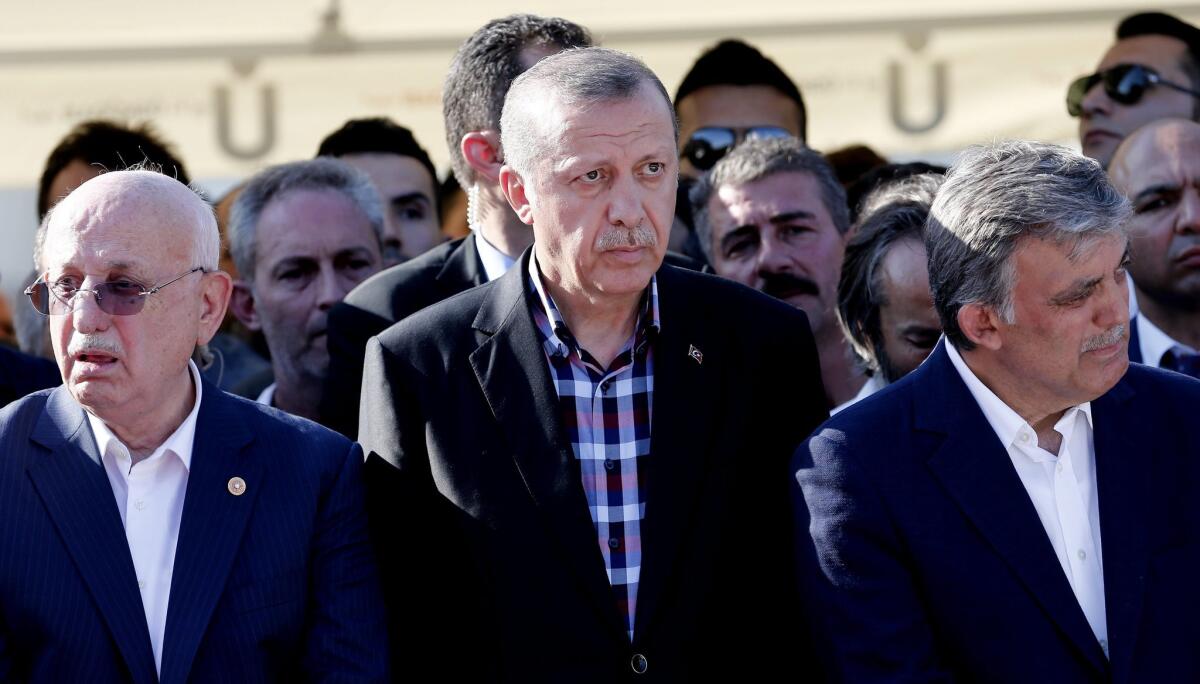Editorial: Democracy in Turkey survives — but for how long?

The failure of an attempted military coup in Turkey, a NATO member and a key ally of the United States, was a welcome victory for democracy in a region with too little of it. But as he exults in the defeat of the plotters, President Recep Tayyip Erdogan seems to be using the rebellion as a pretext for suppressing lawful dissent and purging the bureaucracy of his political opponents. That is a dangerous course.
It’s understandable that Erdogan would arrest participants in last Friday’s uprising by the so-called Peace at Home Council, a group of military officers that claimed to be rescuing the country from Erdogan’s oppression. But the dragnet has swept up a ridiculously large number of people in Turkey’s employ. The government has detained thousands of military officers and has suspended 3,000 members of the judiciary and 9,000 officials in the interior ministry.
Officials acknowledged that the names of many of those being detained were taken from a list drawn up before the attempted coup as part of an investigation into the influence of Islamic cleric Fethullah Gulen, a former Erdogan ally who now lives in exile in the United States.
Erdogan blames Gulen and his Hizmet movement for the attempted coup, and he has called on President Obama to “either arrest Fethullah Gulen or return him to Turkey.” Appropriately, Secretary of State John F. Kerry said that the U.S. would consider a request for Gulen’s extradition only if Turkey offered “legitimate evidence that withstands scrutiny.” So far, such evidence hasn’t been produced.
The U.S. criticized the attempted coup as it was unfolding, with Obama calling on all parties to “support the democratically elected government of Turkey.” Nevertheless, the U.S. long has expressed concerns about a drift toward authoritarianism in Turkey. In its most recent report on human rights in that country, the State Department cited interference with freedom of the news media — including the arrest of 30 journalists, at least some of whom worked at publications critical of Erdogan — and an “overly broad application of anti-terror laws,” resulting in “politically motivated investigations and court verdicts.”
The failed coup mustn’t become a license for further repression. On Monday, Kerry pointedly reminded Turkey that the treaty that created the NATO alliance commits member states to respect “principles of democracy, individual liberty and the rule of law.” Federica Mogherini, the head of foreign affairs for the European Union, which Turkey aspires to join, stressed “the importance of the rule of law prevailing” in that country.
The U.S. and its allies depend on Turkey, and not only as a member of the NATO alliance. The U.S. Air Force has used the air base in Incirlik to launch air strikes against Islamic State. But Turkey also benefits from its association with Europe and the U.S. That relationship will become more strained if Erdogan undermines the democracy he claims to represent.
Follow the Opinion section on Twitter @latimesopinion and Facebook
More to Read
A cure for the common opinion
Get thought-provoking perspectives with our weekly newsletter.
You may occasionally receive promotional content from the Los Angeles Times.










